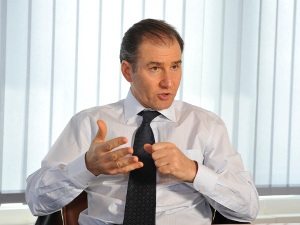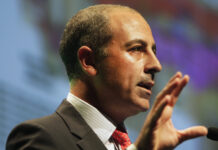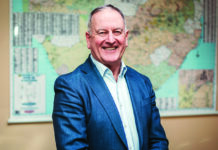
ROUGHLY $8bn to $10bn has been raised by newly founded private equity
companies, many of them started by former resources bankers or mining executives, in
an effort to participate in an estimated $40bn worth of divestments by major mining
companies such as BHP Billiton.
The question is, however, whether private equity has “the legs’ to remain a valid
alternative to traditional forms of lending, such as banks.
According to Glencore Xstrata CEO, Ivan Glasenberg, private equity will struggle.
“Now there are a lot of private equity guys starting companies, a lot of guys who left the
industry and started private equity groups. It’s never worked in the past,’ he said.
“The problem with the commodities space if you have high gearing is that you are
not running Boots pharmaceutical where you have a pretty constant earnings base,’ said
Glasenberg.
Another analyst said it was noticeable that private equity couldn’t compete in the
big deals. The sale of Glencore’s $5.5bn Las Bambas copper project in Peru went to
China’s part-state-owned group, Minmetals, suggesting that start-up companies are
battling against sovereign funds for big mining deals.
“Also, the traditional investment cycle of private equity is between five to seven
years whereas mines are decade-long investments,’ said another analyst.
Yet there has been a flowering of former mining executives and bankers seeking to
breath new life into their careers, many of them South Africa. Here’s a taste of who’s out
there.
Who’s who in the zoo
Mick Davis – X2 Resources
Davis has yet to invest any capital but with $3.75bn lined up from backers that include
the hefty commodity trading company, Noble Group, X2 Resources is clearly going to
beat a path to deals at some point. The question is when. Davis may be conscious of
former colleague Brian Gilbertson’s guile and composure when having listed Billiton in
the UK, took the best part of a year before plumping for an acquisition.
Davis, too, has his own experience to draw from. The last time the mining market
was under pressure – around 1998 – Davis was setting about building Xstrata which he
subsequently merged with Glencore in 2013. At the time, Davis bought the chrome and
coal assets formerly owned by Suddelektra and which had been pushed into Glencore. If
anyone can make private equity work in the mining space, it would be Davis.
Lloyd Pengilly – QKR Corporation
Pengilly, a former banker with JPMorgan Cazenove of some 28 years standing, has
raised $1bn with the support of Qatar Holding, a subsidiary of the country’s sovereign
wealth fund, and Kulczyk Investments which is owned by Jan Kulczyk, Poland’s richest
man.
The fund also includes former BHP Billiton executives, Andre Liebenburg and David
Munro. Among their first investments was to take control of AngloGold Ashanti’s
Namibian mine, Navachab, for $110m, although Pengilly hastens to add the fund is not
wholy focused on gold.
Michael Scherb & Verne Grinstead – Appian Natural Resources Fund
Scherb and Grinstead are former JPMorgan Chase & Co bankers who founded
Appian two years ago and have raised $375m to date for acquisitions. The team also
includes two Anglo Americam emigres, Robin Mills who was last executive director of
projects with Anglo American Platinum, and Tony Redman, a former technical director of
Anglo American.
Scherb told Bloomberg News that he thought traditional sources of capital were
going to dry up in the sector. So far, the company has completed three deals totalling
$100m, including a stake in Red Eagle Mining Corporation. More acquisitions were
planned for Latin America and Africa.
The others – KKR & Company, Magris Resources, Strand Advisors
Leigh Clifford, a former CEO of Rio Tinto is advisor to private equity firm KKR &
Company which was considering bidding for the $1bn Australian copper mine
Northparkes. Aaron Regent, fired as CEO of Barrick Gold in 2012, established Magris
Resources which aimed at assets in the Americas.
Then there is SAS veteran, Ian Hannam, dubbed the king of M&A resources while at
JP Morgan Cazenove and now a member of his own start-up, Strand Partners – although
strictly-speaking this is an advisory firm.










